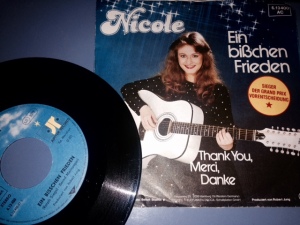This week is all about the Eurovision Song Contest in the Austrian media, and even though I am several thousand miles away, I am keeping up with the contest. Watching the Eurovision Song Contest is a tradition that I grew up with and that is hard to shake even after years abroad. Yes, many of the songs are not really that great and most sound the same as songwriters seem to believe there is a certain formula to a winning song – either dramatic ballads with a full orchestra or happy, snappy dance songs. This is American Idol but for all of Europe and with only one chance/song to win it all and of course national pride on the line as if it were a world championship in a popular sport. This year, the definition of “Europe” seems to have been expanded as this is the first year that Australia is also participating in the contest (I somehow missed that explanation).
According to the official Eurovision website, 180 million viewers watch each year as up to 43 countries participate (the highest number in 2011). The contest has been in existence continuously for the last 60 years, so it is truly a tradition in May. The commentators are usually tri- or bilingual, and the Eurovision Song Contest was my first experience with numbers and names of countries in French as the commentators announce the points earned per country in English and then French before the local TV announcer translates everything into German in my case. I know just a few key sentences in French, but I am still great with countries and numbers up to 12 just because of this show.

Buks Fizz won the Eurovision Song Contest in 1981 with the song “Making Your Mind Up.” Side note: Who comes up with these band names!?
The voting system has changed over the years; viewers can vote for songs but not the song of their own country (which makes the immigrant vote important to some); in addition, a national jury of five music professionals that are also citizens of the country votes for the best songs; the two rankings are combined, and the results are given live during the broadcast: 12 points for the top-ranked song, ten points for the second-highest ranked song, and so on. So far Norway has been at the bottom the most over the years – 11 times; Ireland has won the most contests with seven wins. Austria has won twice – in 1957 and in 2014, which is also the reason why this year’s competition takes place in Vienna, Austria. The contest is also a great opportunity to show videos of the country and culture in between performances to support the tourist industry of the country, so yes, it is a big deal.
Currently the semifinals are happening before the big finale on Saturday evening (European time) and lunchtime California time. If you are curious, you can watch the videos of all songs here http://www.eurovision.tv/page/vienna-2015/about/contestants or watch the live stream on Saturday, May 23 online (if you live outside of Europe). Since it is a contest, one can also bet on it (but not in Vegas); online sites seem to favor Sweden as winner before Russia and Italy. I actually find the bad songs a lot more entertaining to watch. Here is a great link to watch some of the worst songs throughout the years: Worst Songs.
Many of the worst and thus most entertaining songs do not survive the semifinals, so you may want to tune in now before the finale on Saturday. So far, I do not have a favorite on either side of the spectrum yet, but there are still a lot of hours online ahead.



You must be logged in to post a comment.